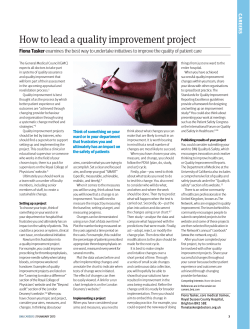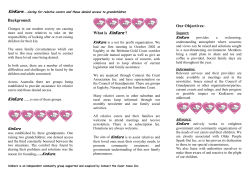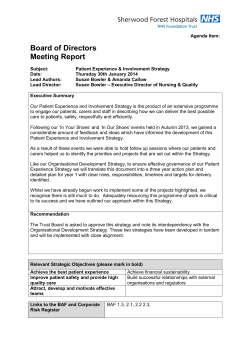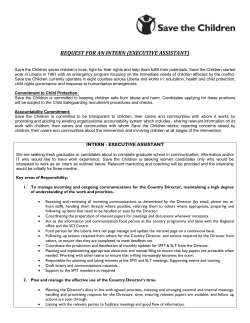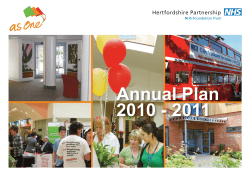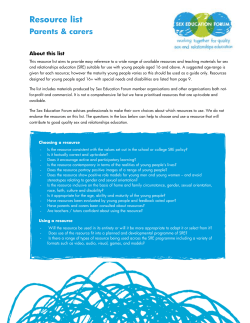
Aquarius Unit Adolescent Acute Psychiatric Service A Referrer’s Guide
South West London and St George’s Mental Health NHS Trust Aquarius Unit Springfield University Hospital Adolescent Acute Psychiatric Service A Referrer’s Guide 1 Who we are Aquarius is a short stay open inpatient unit with ten beds for young people aged 12-17 during a period of acute mental health crisis. We provide daily 24-hour medical and nursing care for urgent or planned admissions. Aquarius is staffed by a multidisciplinary team which assesses, and then reduces and manages the risk to the young person while in our care. The team comprises child psychiatrists, clinical psychologist, occupational therapist, social worker, mental health nurses, teachers and administrative staff. We work in collaboration with referring teams to help the young person move back to an appropriate community setting as soon as possible. Whiskey, a Pet as Therapy volunteer dog, is a weekly visitor to Aquarius Ward 2 3 Our philosophy Who the service is for The service will work within relevant statutory frameworks including the Children’s Act 1989, the UN Convention on the Rights of the Child, the Mental Health Act 1983 and the Mental Health Code of Practice. When this constitutes an acute mental health crisis requiring a short-term hospital admission, the Unit will work with young people suffering from serious mental health problems, such as psychotic illness, bipolar affective disorders, depression, severe anxiety disorders and obsessive compulsive disorders. Eating disorders are treated in a national Eating Disorder Service, located on the Springfield Hospital site, with whom we share resources. The needs of the young person will be paramount in determining the best course of treatment for the individual. The service will aim to be flexible and empowering in offering a package of care to meet the needs of the young person. Parents, carers and young people will be actively involved in formulating a treatment plan. Parents, carers and young people will be provided with verbal and written information to assist them in making informed decisions. The service will be equally accessible to all young people in acute mental crisis regardless of race, culture, gender, disability, sexual orientation or class. The service will aim to avoid or keep to a minimum the stigma, institutionalisation and trauma inpatient admission may bring. The service will actively seek the views of carers, young people and referrers and incorporate these into service provision where possible. Admissions are generally agreed with the young person and the relevant carers. However, we are able to admit under the Mental Health Act provided 4 5 Referrals that the young person can be contained on an open unit. We work closely with the Adolescent Assertive Outreach Team (AAOT) to make moving in and out of hospital smoother and less stressful, by maintaining this link we aim to keep admissions as short as possible. In some cases we are able to offer day treatment places. Each young person to be considered for admission to the Aquarius Unit must be referred by a clinician from their local CAMHS Tier 3 service. The referral will be supported by a comprehensive written assessment by the Consultant in Child and Adolescent Psychiatry or Specialist Registrar within that service. Supplementary electronic information may accompany the referral, but is no substitute. Unless the young person also has a treatable psychiatric disorder (see page 3), admission will not be offered to those with a primary diagnosis of: When required, we provide a rapid professional response to the initial referral, and have structures in place so that a young person can be admitted in an emergency. ■ ■ ■ ■ ■ In addition to the assessment of individually referred patients, we can offer consultation to the referring service, drawing on the wide expertise and experience of our team. We are here to help, so please contact us. Conduct disorder Substance misuse Eating disorder Moderate to severe learning disabilities Social crises Except under special circumstances, we do not take anyone with a known history of persistent violence, fire setting, serious criminality or sexual offences. On reaching the age of 18 years, a young person still in need of inpatient or day patient services will be transferred into the relevant adult psychiatric service. 6 7 What we offer We provide multidisciplinary clinical intervention on a 24-hour basis, with an age appropriate weekday programme including schooling and a vibrant youth club. It is intended that treatment be tailored to the need of the individual young person and that it be evidence based, with a care plan, risk assessment and a risk management plan. In additional to an identified care co-ordinator, each young person on the ward will have a named and an associate nurse. The progress of each young person is regularly reviewed by members of the multidisciplinary team, who also provide liaison with the referring CAMHS team, community and local resources. We aim to take into account the views of carers, young people and their referrers, incorporating these when possible into the care plan. In-patient management involves a synthesis of nursing care, psychological treatment, medication, and education. Psychological approaches include individual and group therapy, art and exercise groups, family work and psychosocial interventions such as problem solving, life-management skills and practical assistance. We enforce a clear set of rules of acceptable behaviour on the unit, and we encourage the involvement of parents and carers in support groups. In addition to visiting, home leave is considered an important aspect of treatment. 9 8 What it’s like Aquarius Unit is a comfortable friendly place, attractively decorated and furnished. Each young person has an individual bedroom, with separate washing facilities for boys and girls. Recreational space and the dining area are shared by in-patients and day patients. There is supervised access to an outside courtyard and to ward facilities such as laundry, ironing, cooking, drinks preparation, and internet access. Access can also be arranged to Trust facilities such as the gym and tennis courts. The classroom is part of the unit, staffed by qualified teachers and teaching assistants who provide as full an educational experience as the young person is ready to receive, based on the National Curriculum. In general, the classroom strives to enhance the self -esteem and confidence of its pupils. If appropriate, young people are encouraged to take public examinations and are assisted in their applications to further education. A recent OFSTED inspection gave the school an outstanding report. The unit is a member of the Quality Network for Inpatient CAMHs (QNIC) and the care provided is benchmarked with other member units in the UK. There is input from visiting artists and specialist teachers. Also, the school offers several educational outings during the course of a term. The ward has a ‘chill-out’ room that is equipped with Snoezelen relaxation specific furniture offering a calming experience that can be used as part of treatment with input from the staff team. On planned discharge from Aquarius, a party is held to mark the young person’s achievement in moving on. The ward does not offer any follow-up once young people are well enough to leave hospital, neither does it encourage return visits by former in-patients. 10 11 Feedback is regularly received, following treatment, on the experience that patients have had: “ When my day isn’t productive and has empty spaces in it, I find it difficult. So, coming into the ward fills up the day and it has a structure. I am always kept busy and it can help me get through the day. ” Feedback questionnaires state areas they liked: “ Ward consultant very well informed about my illness ” “ “ The staff ” “ “ . . . the respect they show on equality and diversity ” Warm and friendly feeling from staff, always made welcome, always staff at the end of the phone . . . ” Extremely professional and helpful staff creating a welcoming, secure and safe friendly environment, instilling confidence in their care and approach. ” A parent said the thing they liked was “ the way my child was treated and looked after. ” Recovery story from a young person: My OCD has been affecting me noticeably for just over a year but in this time, it had gradually been getting worse, till the point where I was barely able to function. I would have my ridiculously long baths, which take anywhere between three and seven hours, depending on how distressed I was. In the space of a few months, I went from full-time attendance at school, participating in extra-curricular activities and having a social life, to not being able to attend school, and if so only once or twice a week. I was offered in-patient treatment at Aquarius. This intensive treatment proved to be exactly what I needed. I quickly made noticeable changes; I cut my shower time down and was able to participate in the day programme. One of the main tasks I am now able to do is my washing, whereas I had previously relied solely on others to do this for me. The end goal for my treatment was to be able to go to college, something which seemed quite unrealistic to me, but I am now attending everyday and coping really well and most importantly enjoying it! 12 Contact details Aquarius Unit Building 5 Springfield Hospital 61 Glenburnie Road London SW17 7DJ Tel: 020 3513 5421 Fax: 020 3513 5439 The nearest tube station is Tooting Bec (Northern Line), a 12-15 minute walk. Bus G1 serves Springfield Hospital itself. On nearby Trinity Road there are buses 219 and 319. On Upper Tooting Road there are buses 57, 155, 219 and 355. On Tooting Bec Road there are buses 249 and 319. Design from The Drawing Room www.drawingroom.uk.com How to find us Photography by Paul Lapsley Switchboard tel: 020 3513 5000 Specialist Services Directorate tel: 020 3513 6305 Email: business.development@swlstg-tr.nhs.uk Revise Feb 2012
© Copyright 2025


